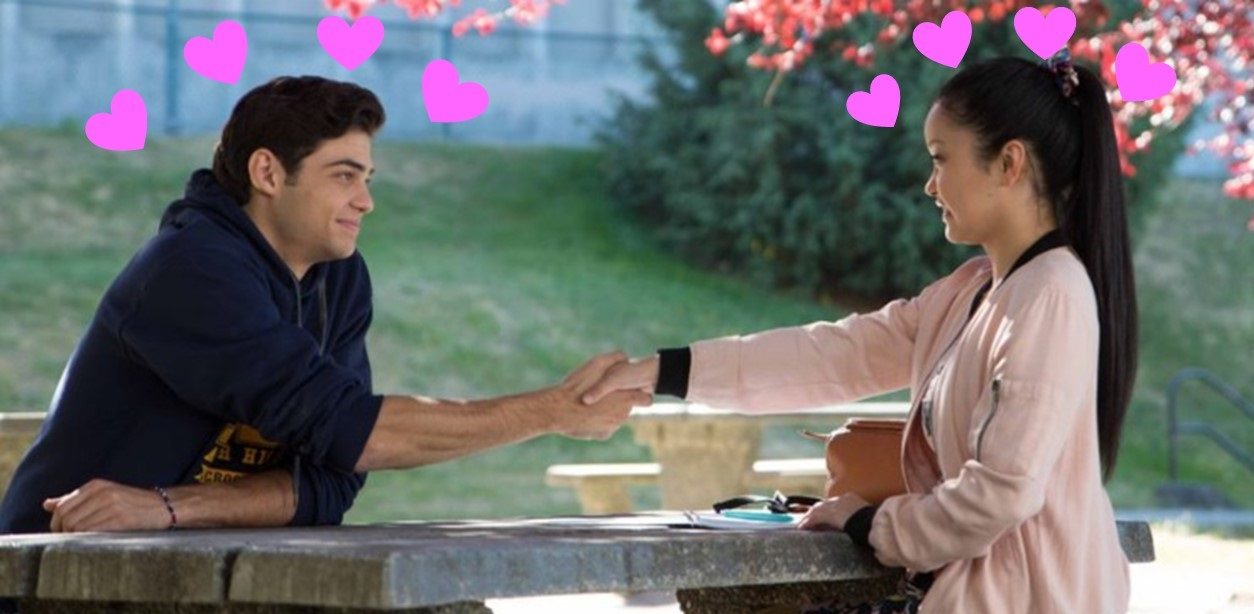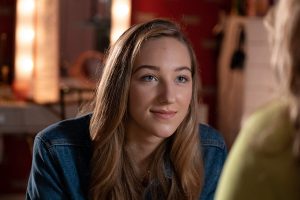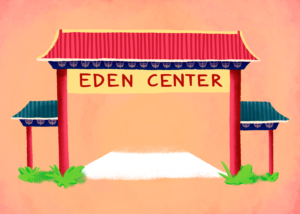Still making waves from its June release to Amazon Prime Video, The Summer I Turned Pretty checked off all the boxes for a quintessential summer drama: first love and subsequent first heartbreak, a messy love triangle, and that coming-of-age magic that captures the hearts of every high schooler. The series follows fifteen-year-old Belly (Lola Tung) and her rollercoaster of emotions as she tries to resolve her feelings for two brothers, Jeremiah and Conrad (Gavin Casalegno and Christopher Briney, respectively). The series’ casting decisions were met with a surge of controversy: while Tung is half-Asian, both Casalegno and Briney are white. As a result, a sentiment echoed by many in response to the cast release ran along the lines of “…of course it’s a white guy.” The big and small screens are no stranger to white-man/Asian-woman couples, from Lane Kim and Dave Rygalski in Gilmore Girls to Lara Jean and Peter Kavinsky in To All The Boys I’ve Loved Before (2018). Such tropes, however, hold problematic implications for the overall perception of Asian identity.
Asian characters were first introduced into American cinema in the twentieth century and only took on more prominent roles towards the 1990s, with the release of The Joy Luck Club (1993). In these early films, the casting of an Asian—almost exclusively East Asian—woman with a white man directly resulted from an attempt to appeal to Hollywood’s core audience: white men. The fetishization of Asian women lies at the intersection of sexism and racism: whether it is explicitly called out as “yellow fever” or disguised as “preferences,” Asian women have historically been viewed as ‘exotic’ objects of sexual and aesthetic desire in the white male gaze. Such hypersexualization is dehumanizing: as Asian women are no longer viewed as real, individual people, they become frequent victims of offensive humor, bigotry, and in the worst cases, physical violence.
Asian men, on the other hand, have been portrayed by the media as romantically undesirable and awkward, often used as the funny sidekick or the butt of the joke due to a lack of social awareness or nerdy and unkempt appearance. Some advances have been made in reimagining this stereotype— with the casting of Simu Liu in Shang-Chi, for example— but the old overarching depiction still sticks. Conversely, white male characters are written to be the charismatic and conventionally beautiful “knights in shining armor” that come in at the climax to save the girl. Today, these stereotypes might be less obviously relayed in film and television, but there is no denying their underlying presence and historical significance.
In recent years, the motives behind this particular biracial casting choice have evolved to be more complex. Asian women in America have become increasingly accused of solely desiring relationships with white men and having “wasian” children, in equal parts due to the perception of Asian women as “white-worshiping,” and the way in which Western beauty standards greatly favor the appearance of “wasian” kids. As a result, the female character in heterosexual romances is often reduced to being very one-dimensional, her personality and storyline built entirely on a quest to resolve her feelings for the white boy. Whether directly proven or implied, such casting choices affirm racist stereotypes of both Asian men and women.
The Summer I Turned Pretty is especially problematic because its casting choices have been touted as progressive moves toward representation. Commenting on her decision to cast Tung as Belly, Jenny Han, author of the original book series and showrunner, claimed that the show’s portrayal of an Asian American family was a showcase of diversity, reflective of present American society. Yet by depicting a half-Asian woman oscillating between two white love interests as the peak of diversity, the series diminishes Belly’s character to her minority appearance and plot purpose in the romantic storyline. While there are surely genuine parallels of such relationships to be found in reality, these are not a representation of all Asian American dating experiences. Therefore, it is not that Han is wrong in branding The Summer I Turned Pretty as an Asian American romance: it simply should not be championed as the Asian American romance.
On a broader scale, such a move stagnates the progress that has already been made. If viewers are forced to be satisfied and complacent with this degree of representation, there is little reason or incentive for creators to push harder for more encompassing inclusion of the diverse range of Asian experiences. Interracial relationships of all types and involving all identities of people exist, and deserve to be given equal celebration and appreciation. Media and popular culture play a key role in both forming and reinforcing stereotypes: if we want to overturn them, we have to expect more from film and television.
The Asian American experience is multifaceted and nuanced. It deserves to be captured by media and popular culture not just in its entirety, but as an independent experience, and Asian characters deserve to exist without being defined in relation to whiteness. Progress has been made with films like Crazy Rich Asians (2018) and Always Be My Maybe (2019), but there is a long way to go until Asian couples are portrayed in every context, including a typical high school romance. If creators want to appeal to Asian American audiences, their focus should be turned to showcasing the uniqueness of culture and relationships, rather than constantly using Asian women and white men as their “token” interracial relationship to attach their productions to a counterfeit label of diversity.






It is astounding to see an attempt to rebuttal based on the words of a standup comedian. When their profession is literally to amuse audiences through burlesque and ironic lines, how in the world does one take that seriously to even think about using it to back an argument?
Even if the writers of aforementioned shows are Asian and female, that as a basis will never be definitive to prove that Asian women have preferences for White men. An incompetence to see beyond structural barriers (i.e. most writers have very little autonomy over what they want to write, and instead write what’s more palatable to the audiences for commerical reasons) leads to the misconceptions your response holds. Morever, these female writers’ preferences will never fully encapsulate the spectrum of Asian women there is. Stop the generalization. When the article discusses how the need to explore a broader range of multifaceted, diverse, and nuanced experiences, pointing out that there is a lack of it is not constructive and honestly points to your poor comprehension.
There is also absolutely no whiteshaming. The article points to a pattern in the film industry and why that potentially can be problematic. It is perhaps that you aren’t as “alpha” as you think you are and that your little ego takes everything to personal offense. Get help, or learn to shut up.
As someone who grew up with severe internalized racism and have learned to “de-program” myself from self-hatred, I have recently taken a closer look at the way pop culture and media representation shapes our lives, mostly the unconscious bias we may hold as Asian Americans.
I grew up predominantly in an Asian enclave during my elementary years out in the pacific coast, but the rest of my formative years were spent in a private school full of white girls. It was there that I resented my parents for not being white. Not being a white girl myself. Having “almond eyes”. Straight black hair. Flat nose. Etc… The era of television and media were comprised of white protagonists and even the celebration of femininity seemed to shine the spotlight at the beauty of white women. Whereas my Korean school friends were able to see parts of themselves in the K-Dramas/K-Movies they took in, my pop culture diet consisted of the latest episodes of “The O.C”, “Gossip Girl”, “One Tree Hill” and movies like “Legally Blonde”, The Devil Wears Prada” and endless romcoms where the lead was 50% Matthew McConaughey. Yeah, a WHOLE lot of pretty white people I wanted to desperately be a part of.
Guess that played out in real life as my first 4 boyfriends were all white. After all, if the message the media sent out was “the man of your dreams has blue/brown eyes or blond/brown hair”, how else would I have taken that package? If the 7 and a 1/2 years I spent at that private school was any indication, I was already predetermined to focus on marrying a 6’4 athletic straight white male named ‘Shawn’ or ‘Rob’ and saw everything else as a failure. Yes… I was that deep into my internalized racism.
Thank goodness for University though! Moving back to the West Coast literally saved my mental health. There was this poison inside of me during those near 8 years. I was slowly ingesting from the well of white supremacy and it was killing me. When the realization that I wasn’t white settled in, I was focused on punishing myself for not being the Blonde beauty I was seeing on TV, on the big screen, on billboards, beauty mags, the box cover of my makeup remover for gods sake. I was so lost in chasing an untouchable white fantasy that the moment I set foot on the campus of the University, reality settled. I was seeing people from all walks of life. People. Real people! Not the monotonous drab of endless whiteness. For the first time, I didn’t feel like an outlier. Most of all, I didn’t need to be “white Sharon”. I could be Sharon. I didn’t need a future where the ‘Shawns’ or ‘Robs’ of the world were the end all-be all. For the first time, I could actually see myself with someone who spoke the same language I spoke. I didn’t need to explain the “weird traditions” that my culture held during dinner. The “smelly, funny sounding foods” I tried to hide was now a celebration and have become normalized as part of a daily diet.
So now comes the part where we as Asians collectively analyze what the state of Asian American representation in Hollywood, the number 1 exporter of pop culture.
We see ourselves as AAPI superheroes (Miss Marvel, Shang-Chi, Black Adam), romantic protagonists (Crazy Rich Asians), dramatic award winners (Minari, The Farewell, Parasite) and even animated characters (Raya and the Last Dragon, Moana, Turning Red). Not to forget, the outstanding ‘Everything Everywhere All at Once’ we got this year. I’d say that’s miles ahead of where we were even a half decade back.
Without acknowledging the poor excuse of a comment by the individual above, I do have questions as to why AAPI women in Hollywood keep coming up with a white love interest or 2nd protagonist for stories where Asian women are centered.
For the record, I’m not shaming or condemning these creators. Just like I grew up with an unconscious bias for white male characters in the stories I consumed, these women undoubtedly have been exposed to the same archetypes that probably seep in to their storytelling. My question now is that we’ve made such progress that we should be able to incorporate races outside of whiteness into our cultural landscape. Every time I see the white male / asian women pairing in pop culture media, it brings me back to a time where white men had the pen and they saw us as exotic creature meant for conquering. Why are we boxing ourselves in like this?
Much like Elaine Hsieh Chou’s fantastic essay on white women’s part in minimalizing Asian women, I’d like the same spotlight focused on how Asian creatives can incorporate for more inclusive stories.
We can be so much more with regards to representation.
Most of America is white and most men who’ve asked me out is white. 50%+ Asian women in American are with white men… Asian women criticizing other Asian women for “representing” them wrong because they themselves are insecure about how the interracial relationship is seen need a wake up call.
Touch some grass, seriously.